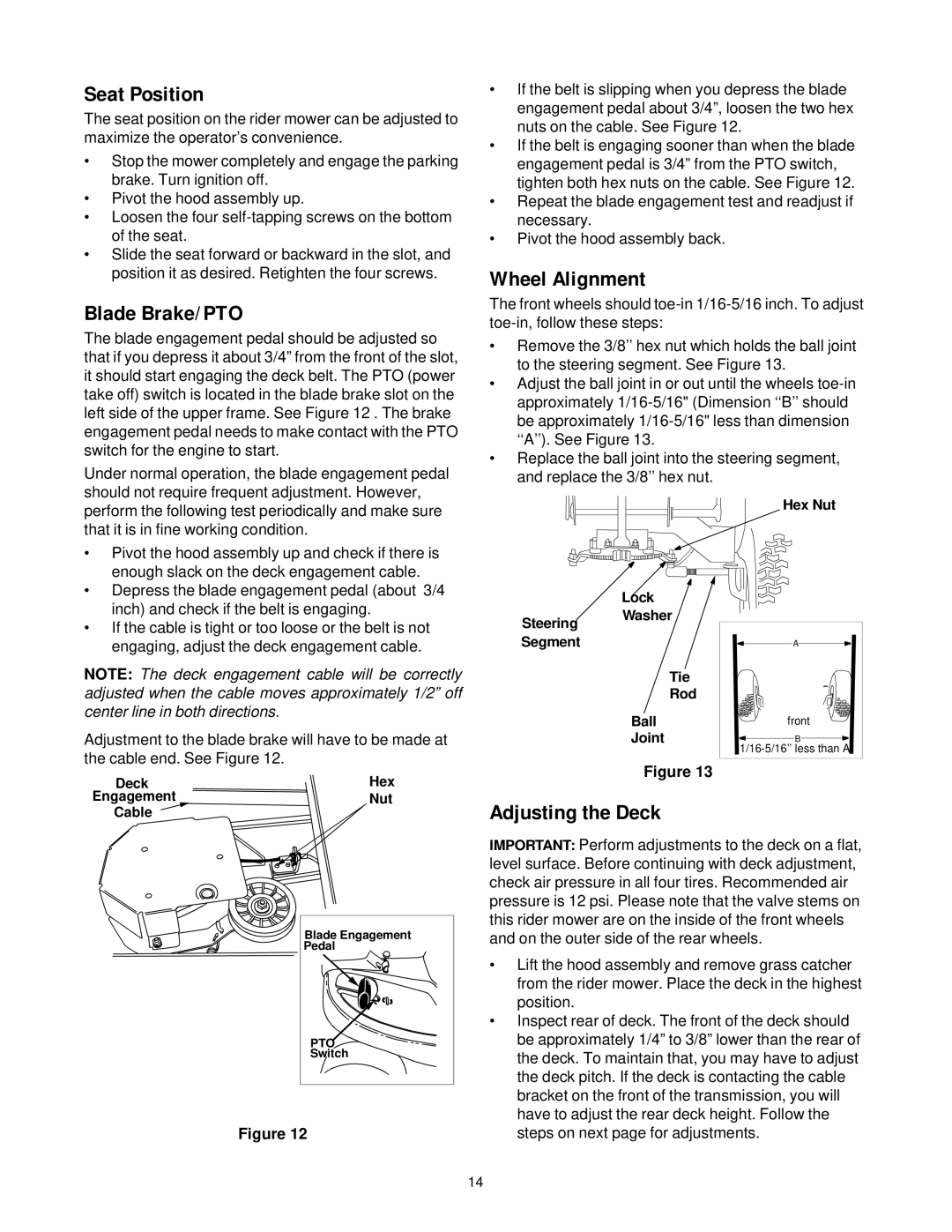
Seat Position
The seat position on the rider mower can be adjusted to maximize the operator’s convenience.
•Stop the mower completely and engage the parking brake. Turn ignition off.
•Pivot the hood assembly up.
•Loosen the four
•Slide the seat forward or backward in the slot, and position it as desired. Retighten the four screws.
Blade Brake/PTO
The blade engagement pedal should be adjusted so that if you depress it about 3/4” from the front of the slot, it should start engaging the deck belt. The PTO (power take off) switch is located in the blade brake slot on the left side of the upper frame. See Figure 12 . The brake engagement pedal needs to make contact with the PTO switch for the engine to start.
Under normal operation, the blade engagement pedal should not require frequent adjustment. However, perform the following test periodically and make sure that it is in fine working condition.
• | Pivot the hood assembly up and check if there is |
| enough slack on the deck engagement cable. |
• | Depress the blade engagement pedal (about 3/4 |
| inch) and check if the belt is engaging. |
•If the belt is slipping when you depress the blade engagement pedal about 3/4”, loosen the two hex nuts on the cable. See Figure 12.
•If the belt is engaging sooner than when the blade engagement pedal is 3/4” from the PTO switch, tighten both hex nuts on the cable. See Figure 12.
•Repeat the blade engagement test and readjust if necessary.
•Pivot the hood assembly back.
Wheel Alignment
The front wheels should
•Remove the 3/8’’ hex nut which holds the ball joint to the steering segment. See Figure 13.
•Adjust the ball joint in or out until the wheels
•Replace the ball joint into the steering segment, and replace the 3/8’’ hex nut.
Hex Nut
Lock
• | If the cable is tight or too loose or the belt is not |
Steering
Washer
engaging, adjust the deck engagement cable. |
NOTE: The deck engagement cable will be correctly adjusted when the cable moves approximately 1/2” off center line in both directions.
Adjustment to the blade brake will have to be made at the cable end. See Figure 12.
Deck | Hex |
Engagement | Nut |
Cable |
|
Blade Engagement |
Pedal |
PTO |
Switch |
Figure 12
Segment
Tie
Rod
Ball
Joint
A |
front |
B |
Figure 13
Adjusting the Deck
IMPORTANT: Perform adjustments to the deck on a flat, level surface. Before continuing with deck adjustment, check air pressure in all four tires. Recommended air pressure is 12 psi. Please note that the valve stems on this rider mower are on the inside of the front wheels and on the outer side of the rear wheels.
•Lift the hood assembly and remove grass catcher from the rider mower. Place the deck in the highest position.
•Inspect rear of deck. The front of the deck should be approximately 1/4” to 3/8” lower than the rear of the deck. To maintain that, you may have to adjust the deck pitch. If the deck is contacting the cable bracket on the front of the transmission, you will have to adjust the rear deck height. Follow the steps on next page for adjustments.
14
